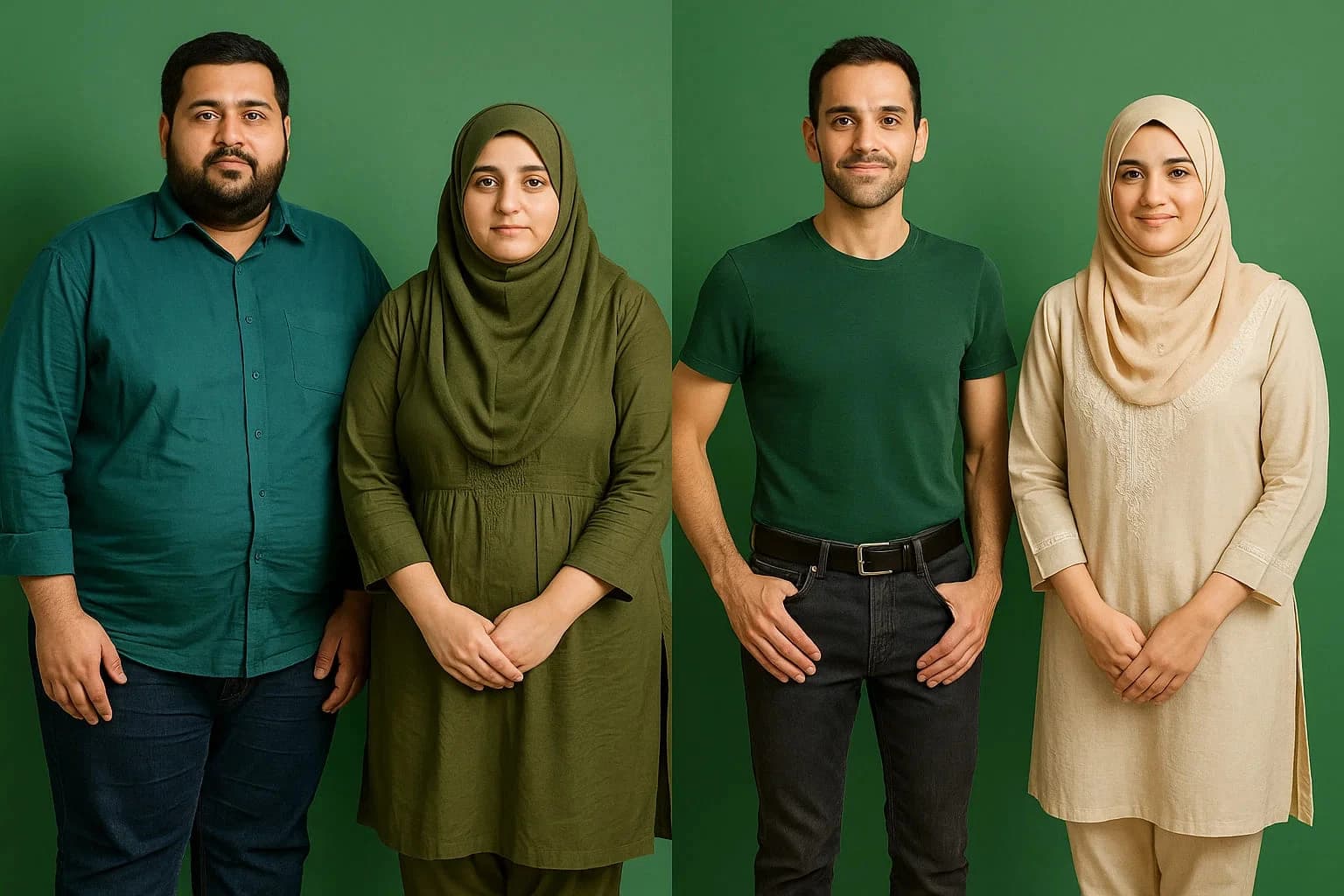© 2025 Roz UpdatesbyTETRA SEVEN

* All product/brand names, logos, and trademarks are property of their respective owners.
In the ever-evolving landscape of health and wellness, diet trends have taken center stage—and Pakistan is no exception. From the bustling streets of Karachi to the quieter corners of Peshawar, people across the country are rethinking how and what they eat. Fueled by a combination of global health awareness, increased access to nutrition content online, and personal weight-loss goals, Pakistanis are embracing diet trends that once seemed limited to the West.
Among the most talked-about trends today are the Desi adaptation of the Keto diet and Intermittent Fasting (IF). These methods, once viewed with skepticism, have now become buzzwords in fitness circles, social media platforms, and even drawing-room conversations. What makes these diets particularly interesting in Pakistan is how they’re being tailored to local tastes—think buttered chicken minus the naan or sehri-inspired fasting schedules backed by scientific research.
The shift isn't just cosmetic. With rising rates of obesity, diabetes, and metabolic disorders, more Pakistanis are turning toward structured eating plans not only to lose weight but to regain control of their health. Social media influencers, fitness coaches, and even healthcare professionals have jumped on board, sharing recipes, routines, and real-life transformations.
This blog dives into the diet trends Pakistanis swear by—from Desi Keto to time-tested Intermittent Fasting. We’ll explore how these plans are being localized, what benefits and challenges they offer, and how cultural preferences are shaping a uniquely Pakistani approach to healthy eating. Whether you’re curious about low-carb saag or wondering how IF fits into a chai-loving lifestyle, this guide will unpack everything you need to know to make informed, sustainable diet choices in a Pakistani context.
The standard keto diet focuses on high fat, moderate protein, and very low carbohydrates—an idea that might seem at odds with Pakistan’s roti- and rice-heavy cuisine. However, creative home cooks and nutritionists have found ways to “desi-fy” keto, preserving traditional flavors while adhering to the diet’s macro requirements. Cauliflower rice replaces basmati, almond flour is used for keto parathas, and ghee-laden curries continue to play a starring role—just without the naan or potatoes. Dishes like keto haleem, butter chicken without rice, and keto-friendly kheer made with coconut milk are now widely shared across YouTube channels and Facebook groups.
For many, Desi Keto offers quick weight loss, improved blood sugar control, and increased energy levels. Its emphasis on fats and proteins fits naturally with dishes already rich in ghee, meat, and cream, making it easier for some Pakistanis to adopt than Western-style low-fat diets. However, challenges include limited access to keto-specific ingredients, social pressure during family meals, and the difficulty of maintaining the diet during weddings, Eid, or Ramadan. Eating out also becomes tricky, with most restaurant menus heavily reliant on carbs.
Facebook groups like “Keto Pakistan” and Instagram accounts like @pakistaniketoqueen are filled with success stories—students shedding exam weight, mothers regaining postpartum energy, and professionals reversing pre-diabetic conditions. Many attribute their success to support from local online communities that share meal plans, desi recipes, and motivation. Nutritionists such as Sania Baloch and Dr. Nida Awan have also gained popularity for offering keto coaching tailored to South Asian needs.
The Desi Keto trend shows that traditional cuisine and modern health goals don’t have to be at odds. With the right tweaks and community support, Pakistanis are making keto work for their culture, palate, and lifestyle.
Intermittent fasting (IF) isn’t new to Pakistan. In fact, it aligns closely with cultural and religious practices—most notably, the Islamic tradition of fasting during Ramadan. However, modern IF strategies like 16:8 (16 hours fasting, 8 hours eating), 5:2 (five regular eating days, two low-calorie days), and OMAD (One Meal A Day) have gained traction among Pakistanis seeking structured, sustainable ways to lose weight and improve health. These methods offer flexibility and are increasingly seen as lifestyle choices rather than temporary diets.
Pakistanis turning to IF report weight loss, better digestion, clearer skin, and increased mental clarity. Scientific studies support these claims, pointing to improved insulin sensitivity, reduced inflammation, and even longevity benefits. For those dealing with metabolic disorders like Type 2 diabetes—a growing issue in Pakistan—intermittent fasting offers a drug-free way to regulate blood sugar levels. Because it focuses on when you eat rather than what you eat, IF is especially attractive to those who don’t want to drastically change their diets.
Adopting IF in Pakistan is made easier by the natural rhythm of local life. Many people already eat dinner early and delay breakfast, unintentionally following a 12:12 or 14:10 fasting schedule. To make IF more effective, experts recommend hydration, avoiding fried foods during the eating window, and gradually increasing fasting hours. Apps like Zero and local WhatsApp groups help users track progress and share motivation. Additionally, dietitians like Zainab Sarwar and Dr. Umair Zafar offer customized IF coaching programs, blending modern science with culturally familiar meal planning.
Intermittent fasting in Pakistan is more than a fad—it's a lifestyle shift rooted in tradition, adapted by science, and embraced by a growing number of people seeking long-term health without compromising cultural norms.
While the Mediterranean diet originates from Europe, its core principles—abundant vegetables, healthy fats, lean proteins, and minimal processed food—have found resonance in Pakistani homes. Dishes like grilled fish with olive oil, lentils with brown rice, and salad with lemon dressing are naturally aligned with Mediterranean principles when given a local twist. As Pakistanis become more health-conscious, many are incorporating more olive oil, whole grains, and fresh herbs into traditional meals. Nutritionists increasingly recommend this diet for heart health, weight management, and its anti-inflammatory benefits.
Driven by global environmental awareness and local health concerns, plant-based eating is gaining popularity among younger Pakistanis. Social media influencers and celebrities have helped normalize reducing meat consumption, while local startups now offer vegan alternatives to desi staples—such as almond milk chai and jackfruit biryani. While full veganism is still rare, many youth are embracing flexitarianism, where meat is limited to a few meals a week. Platforms like Instagram and TikTok play a major role in showcasing plant-based recipes and success stories.
Apps like Instagram, TikTok, and YouTube have become the new nutrition classrooms in Pakistan. Fitness influencers like Shanzay Sheikh, Waleed Babar, and dietitians like Hina Asad now reach thousands daily with recipe videos, before-and-after transformations, and myth-busting content. From chia pudding breakfast bowls to low-carb aloo chaat, these creators are redefining what “healthy” looks like in a Pakistani context. Social media also fosters accountability and support, creating communities around diet challenges, food tracking, and workout regimens.
These emerging trends reflect Pakistan’s evolving food culture—one that blends global knowledge with local tradition. As the demand for diverse, flexible, and health-driven diets grows, Pakistanis are crafting a new narrative around food—one where wellness and cultural pride go hand in hand.
While diet trends like Keto and Intermittent Fasting offer compelling benefits, jumping into a new regimen without medical guidance can be risky. Consulting a certified nutritionist or dietitian is especially important for individuals with pre-existing health conditions like diabetes, thyroid disorders, or heart disease. In Pakistan, where nutritional misinformation is widespread, professional input ensures the diet is personalized, nutritionally balanced, and sustainable. Clinics in urban centers and digital consultations with experts are now more accessible, helping individuals approach dieting with safety and structure.
Not every trending diet is backed by science. “Detox teas,” “zero-carb for 30 days,” and extreme calorie restriction plans are examples of fad diets that promise fast results but often lead to long-term harm. These diets can cause nutritional deficiencies, slow metabolism, and even trigger eating disorders. In Pakistan’s influencer-driven environment, it’s crucial to distinguish between genuine health advice and clickbait. Signs of a fad diet include elimination of entire food groups, unrealistic weight loss promises, and lack of long-term sustainability.
Rather than abandoning roti, daal, or nihari, a safer approach is modification, not elimination. Replacing white rice with brown, using grilled proteins instead of fried, or reducing portion sizes can yield better results than drastic overhauls. Culturally sensitive nutrition guidance emphasizes respecting traditional food while optimizing it for modern health needs. For instance, parathas made with almond flour or korma cooked in olive oil can retain flavor while aligning with dietary goals.
Pakistan’s relationship with food is rich, diverse, and deeply rooted in tradition. Yet, the past few years have marked a significant shift in how many Pakistanis view their plates—not just as a source of satisfaction, but as a key to health and longevity. From adapting butter chicken to fit the Keto diet to using Ramadan-inspired meal timings for Intermittent Fasting, Pakistanis are proving that healthy eating can still be flavorful, familiar, and culturally relevant.
This blog explored some of the most popular diet trends shaping Pakistan’s wellness journey—Desi Keto, Intermittent Fasting, the Mediterranean and plant-based approaches, and the growing reliance on social media for diet advice. Each trend reflects a deeper societal movement toward self-care, body awareness, and proactive health management. However, with this rise in diet culture also comes the need for discernment and safety. Not every trend is suitable for every body type or lifestyle, which is why seeking professional guidance and staying informed is more important than ever.
As we move forward, the key lies in balance—honoring traditional foods while embracing science-backed health practices. Whether you're starting a diet for weight loss, energy, or disease prevention, remember: the best plan is one you can sustain, enjoy, and live with.
So before your next grocery run or iftar prep, pause and ask yourself: Is this nourishing me or just trending? Because in Pakistan’s food evolution, the smartest diet isn’t the trendiest—it’s the one that works for you.

9 October 2025

23 September 2025
No comments yet. Be the first to comment!